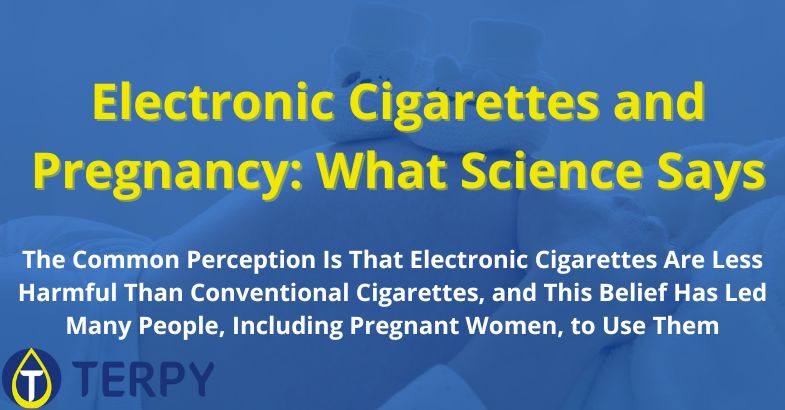Published on: 20/09/2024
The Common Perception Is That Electronic Cigarettes Are Less Harmful Than Conventional Cigarettes, and This Belief Has Led Many People, Including Pregnant Women, to Use Them
The safety of electronic cigarettes during pregnancy is a topic of debate among experts and researchers. In this article, we will explore what science says on this subject by examining recent studies and medical guidelines to understand the potential risks associated with using electronic cigarettes during pregnancy.
The Rise of Electronic Cigarettes
Electronic cigarettes, or e-cigarettes, are devices that vaporize a liquid containing nicotine, flavors, and other chemicals. Introduced to the market in the early 2000s, these devices were marketed as a safer alternative to traditional smoking, as they eliminate the combustion of tobacco, which is responsible for producing numerous toxic substances. Their popularity has rapidly increased, with millions of users worldwide. This growth has also been supported by the belief that e-cigarettes can be a helpful tool for quitting smoking.
How Much Impact Do They Have on Public Health?
Health authorities and public health experts have evaluated electronic cigarettes from various perspectives. On one hand, they are seen as a potential tool for harm reduction for smokers who are unable to quit using other methods. On the other hand, there are concerns about their use among young people and the risk of creating a new generation of nicotine addicts. In particular, the long-term health effects of electronic cigarettes remain unclear, which is especially relevant when it comes to pregnancy.
Read also: Electronic Cigarettes and Young People: Advice for Parents
The Effects of Nicotine During Pregnancy
Before discussing the impact of electronic cigarettes during pregnancy, it is important to understand the effects of nicotine on fetal development. Nicotine is a highly addictive substance and has numerous effects on the human body, many of which can be harmful during pregnancy. Nicotine easily crosses the placenta, reaching the fetus and influencing its development.
Effects on the Fetus
Research has shown that prenatal exposure to nicotine can have several negative consequences for the fetus, including:
- Intrauterine Growth Restriction (IUGR): IUGR is a condition where the fetus does not grow at the normal rate, resulting in a lower birth weight. Liquid nicotine can constrict blood vessels in the placenta, reducing the delivery of nutrients and oxygen to the fetus.
- Preterm Birth: nicotine exposure has been associated with an increased risk of preterm birth, which can lead to significant health problems for the newborn.
- Altered Neurobehavioral Development: studies in animals and humans suggest that nicotine can affect fetal brain development, increasing the risk of neurobehavioral disorders such as ADHD.


Effects on the Mother
Pregnant women are also at risk when consuming nicotine. They may experience increased blood pressure, heart problems, and a higher risk of complications during pregnancy. Given these risks, health guidelines strongly recommend avoiding nicotine during pregnancy.
What Studies Say About Electronic Cigarettes During Pregnancy
Despite the growing popularity of electronic cigarettes, research on their use during pregnancy remains limited. However, several studies have sought to explore the potential effects of e-cigarettes on pregnant women and their babies.
Studies on Rats
Some animal studies have examined the effects of exposure to e-cigarette vapor during pregnancy. One study involving rats found that exposure to e-cigarette vapor during gestation can lead to reduced birth weight and changes in lung development in the offspring. These results suggest that e-cigarette vapor may have effects similar to those observed with traditional tobacco smoke.
Studies on Humans
Direct evidence from human studies is more limited. However, some research has indicated that women who use e-cigarettes during pregnancy are more likely to have babies with low birth weight. Additionally, there are concerns that e-cigarette vapor may contain harmful chemicals that could negatively impact fetal development.
A systematic review of the literature has highlighted that e-cigarettes are not without risks during pregnancy. Although they may be less harmful compared to conventional cigarette smoking, they are certainly not safe. Experts emphasize that complete cessation of nicotine use is the safest option for pregnant women.
Composition of E-Cigarette Vapor
One of the main differences between e-cigarettes and traditional cigarettes is the composition of the vapor compared to tobacco smoke. While cigarette smoke contains more than 7,000 chemicals, many of which are known to be carcinogenic, the vapor of electronic cigarettes is composed mainly of:
- Nicotine: the same addictive substance found in traditional cigarettes.
- Propylene Glycol and Vegetable Glycerin: these are used as humectants to create the vapor.
- Flavorings: added to give flavor to the vapor. There are thousands of flavor combinations, many of which have not been adequately tested for safety when inhaled.
- Heavy Metals and Other Impurities: some studies have found traces of heavy metals such as lead, nickel, and cadmium in e-cigarette vapor, which may be toxic over the long term.
Are Electronic Cigarettes a Useful Tool for Quitting Smoking?
A common argument in favor of electronic cigarettes is their potential usefulness as a smoking quitting tool. Many smokers switch to e-cigarettes in the hope of gradually reducing their nicotine consumption and eventually quitting altogether.
Studies on the effectiveness of e-cigarettes as a smoking cessation aid have yielded mixed results. Some research suggests that e-cigarettes can be effective in reducing the consumption of traditional cigarettes and helping smokers quit. However, other evidence indicates that people using e-cigarettes might merely be replacing one addiction with another, continuing to consume nicotine through e-cigarettes.
In summary, while e-cigarettes may offer a pathway to reduce or quit smoking for some individuals, their effectiveness and potential for replacing nicotine addiction with e-cigarette use require careful consideration and further study.


Recommendations for Pregnant Women
For pregnant women, medical guidelines generally advise against using e-cigarettes as a method for quitting smoking. The best option is to seek professional support through smoking cessation programs that do not involve nicotine. Many health services offer counseling and non-nicotine replacement therapies to help pregnant women quit smoking safely.
Guidelines from Health Authorities
Health authorities worldwide have expressed concern about the use of electronic cigarettes during pregnancy. Organizations such as the World Health Organization (WHO) and the Centers for Disease Control and Prevention (CDC) strongly recommend avoiding the use of nicotine-containing products during pregnancy. These recommendations are based on the potential risks associated with nicotine exposure and the need for safer alternatives for pregnant women.
- WHO: the World Health Organization (WHO) emphasizes that nicotine is a toxic substance that can harm fetal development and advises pregnant women to completely avoid the use of nicotine-containing products, including e-cigarettes.
- CDC: the Centers for Disease Control and Prevention (CDC) warns against using e-cigarettes during pregnancy, highlighting the potential risks to fetal health and the lack of sufficient data to ensure the safety of these products.
Read also: The Environmental Impact of Electronic Cigarettes
In Conclusion
In summary, while e-cigarettes, such as those sold on Terpy, might seem like a less harmful alternative to traditional smoking, scientific evidence suggests that they are not safe during pregnancy.
Pregnant women should make informed decisions about their health and that of their baby, and consult health professionals for the best possible support.





